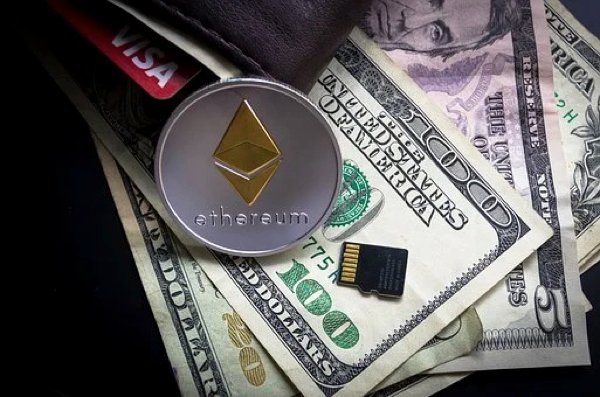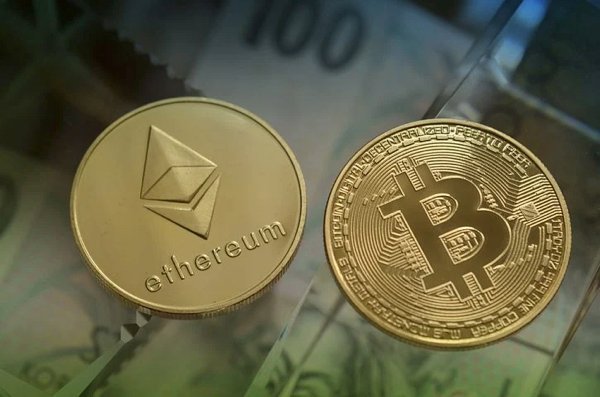Bitcoin vs. Ethereum: An Overview
Ether (ETH), the cryptocurrency of the Ethereum network, is arguably the second most popular digital token after bitcoin (BTC). Indeed, as the second-largest cryptocurrency by market cap, comparisons between Ether and BTC are only natural.

Ether and bitcoin are similar in many ways: each is a digital currency traded via online exchanges and stored in various types of cryptocurrency wallets. Both of these tokens are decentralized, meaning that they are not issued or regulated by a central bank or other authority. Both make use of the distributed ledger technology known as blockchain. However, there are also many crucial distinctions between the two most popular cryptocurrencies by market cap. Below, we'll take a closer look at the similarities and differences between bitcoin and ether.
Cryptocurrency prices are once again on their way up. And if you aren’t in on the action just yet, it may be a good time to jump in. But if you are unfamiliar with how cryptocurrency works, this may leave you wondering just what you should purchase, the more expensive Bitcoin or the cheaper Ethereum?

When it comes to choosing whether to purchase Bitcoin or Ethereum there are many factors you should look at beyond just the price. These are two very diverse cryptocurrencies and they function quite differently. Thus, they are investments that should be considered carefully.
If you want to be sure that you make the right investment for you and your finances, then keep reading to learn more about Bitcoin, Ethereum, and most importantly, which is better for you to buy.

BITCOIN
By now, almost everyone has heard about the cryptocurrency Bitcoin. And while some people still refer to it as “magic internet money,” Bitcoin is a form of digital currency that can be sent, received, and held without needing a bank or financial institution. Think of Bitcoin as a currency that isn’t owned or printed by the government, but rather by people just like you. And Bitcoin is made at a rate that is fair, with a cap to be sure that the coin doesn’t experience massive amounts of inflation like fiat money does.
Bitcoin is made by a process known as “mining” in which miners, or people with fancy computers called nodes, verify transactions for a fee. They then get to keep this fee, as well as some of the Bitcoin their approval process helped to create. The transactions are grouped into blocks, which are added to the Bitcoin blockchain at a steady rate. This whole process uses a special software known as a consensus mechanism, and this specific mechanism is called proof of work because the miners who are mining Bitcoin are looking for the proof that the digital work needed to process a transaction has been done. Bitcoin was launched in January of 2009. There are no physical bitcoins, only balances associated with a cryptographically secured public ledger. Although bitcoin was not the first attempts at an online currency of this type, it was the most successful in its early efforts, and it has come to be known as a predecessor in some way to virtually all cryptocurrencies which have been developed over the past decade.

Over the years, the concept of a virtual, decentralized currency has gained acceptance among regulators and government bodies. Although it isn’t a formally recognized medium of payment or store of value, cryptocurrency has managed to carve out a niche for itself and continues to coexist with the financial system despite being regularly scrutinized and debated.

Ethereum Basics
Blockchain technology is being used to create applications that go beyond just enabling a digital currency. Launched in July of 2015, Ethereum is the largest and most well-established, open-ended decentralized software platform.

Ethereum enables the deployment of smart contracts and decentralized applications (dapps) to be built and run without any downtime, fraud, control or interference from a third party. Ethereum comes complete with its own programming language which runs on a blockchain, enabling developers to build and run distributed applications.
The potential applications of Ethereum are wide-ranging and are powered by its native cryptographic token, ether (commonly abbreviated as ETH). In 2014, Ethereum launched a presale for ether, which received an overwhelming response. Ether is like the fuel for running commands on the Ethereum platform and is used by developers to build and run applications on the platform.
Ether is used mainly for two purposes—it is traded as a digital currency on exchanges in the same fashion as other cryptocurrencies, and it is used on the Ethereum network to run applications. According to Ethereum, “people all over the world use ETH to make payments, as a store of value, or as collateral.”
used to be very similar to Bitcoin, but in the last couple of years, it has grown to be something completely different. To be clear, Ethereum was never a digital currency like Bitcoin is, but rather it is a decentralized network of computers that people can build on. Just like Bitcoin allows people to hold, send, and receive value without having to rely on government institutions, Ethereum is a form of the internet that isn’t owned by any particular company and everyone can pay to use freely.
Ethereum is a cryptocurrency, this means it still uses a consensus mechanism just like Bitcoin, but this is where the similarities end. Rather than relying on miners to verify transactions, Ethereum depends on other users of the network to verify the transactions by staking them. These people are anyone who holds a specified amount of Ethereum and chooses to become a staker for the blockchain. This consensus method is called proof of stake.
Ethereum also doesn’t have a cap, meaning new Ethereum will continue to be produced forever. This isn’t necessarily a bad thing, but it means that the currency isn’t as deflationary as Bitcoin. The capabilities of Ethereum go far beyond those of Bitcoin though, as Bitcoin is a simple payment system, while Ethereum is capable of hosting websites, known as dApps, as well as executing transactions between parties—known as Smart Contracts.

Key Differences
While both the Bitcoin and Ethereum networks are powered by the principle of distributed ledgers and cryptography, the two differ technically in many ways. For example, transactions on the Ethereum network may contain executable code, while data affixed to Bitcoin network transactions are generally only for keeping notes. Other differences include block time (an ether transaction is confirmed in seconds compared to minutes for bitcoin) and the algorithms that they run on (Ethereum uses ethash while Bitcoin uses SHA-256).

More importantly, though, the Bitcoin and Ethereum networks are different with respect to their overall aims. While bitcoin was created as an alternative to national currencies and thus aspires to be a medium of exchange and a store of value, Ethereum was intended as a platform to facilitate immutable, programmatic contracts, and applications via its own currency.
BTC and ETH are both digital currencies, but the primary purpose of ether is not to establish itself as an alternative monetary system, but rather to facilitate and monetize the operation of the Ethereum smart contract and decentralized application (dapp) platform.
Ethereum is another use-case for a blockchain that supports the Bitcoin network, and theoretically should not really compete with Bitcoin. However, the popularity of ether has pushed it into competition with all cryptocurrencies, especially from the perspective of traders. For most of its history since the mid-2015 launch, ether has been close behind bitcoin on rankings of the top cryptocurrencies by market cap. That being said, it's important to keep in mind that the ether ecosystem is much smaller than bitcoin's: as of January 2020, ether's market cap was just under $16 billion, while bitcoin's is nearly 10 times that at more than $147 billion.
THANKS FOR READING THIS ARTICLE.
HOPE IT WAS KNOWLEDGEFULL TO ALL OF YOU . PLEASE FOLLOW AND UPVOTE TO MY ARTICLE FOR MORE INFRMATIONS.